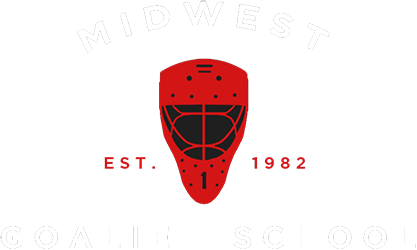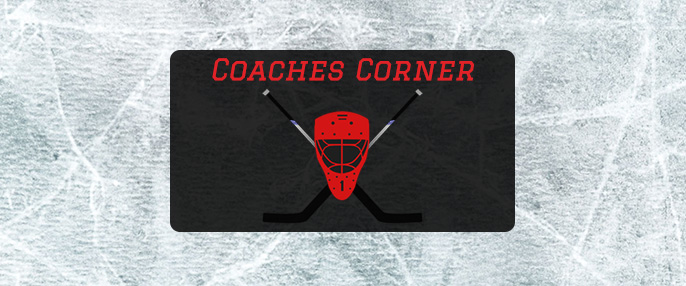

5 of our instructors were asked to identify what they have learned so far this season from an on ice, technical perspective, as well as something away from the crease that has made them a more mature goalie. This shows that every goalie is different and uniquely walks their path to success, learning things at different times. It also shows that no matter what level, there are some things that are universally experienced by goalies. Each of us may learn under a different set of circumstances, but one thing we all have in common is that the process of getting better is never complete.
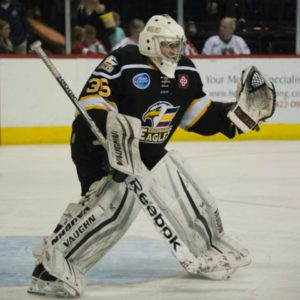
Eric Levine
On Ice Lesson
This season has really tested my game from a technical standpoint because I’ve gotten the opportunity to play a consistent number of games in the ECHL to really experience the challenge that has to offer. The puck moves fast, very fast, and keeping up with the play and being consistently ready to react is key. The main difference I notice from the level I was playing at before (SPHL) is the passing skill. There are more passes that connect tape-to-tape that put players in grade A scoring situations. This forces me to be very decisive with my movements but more importantly, be very good with my balance.
The way that I adapted to this style of play was to lower my stance slightly, forcing my center of mass lower to the ice. In doing so, I have felt myself more “reactive” to pucks because I’m able to move into pucks, not having to reach for them. The transition wasn’t anything too major or complicated, rather it was a slightly lower body bend and wider hand arrangment. This has paid off tremendously in my game.
Off Ice Lesson
Not unlike last year, I have learned the value that enjoyment brings to my game. It seems that when I had on ice struggles to begin the year, I was also thinking way too much and trying to plan out in my head what would happen if I played good this game or bad this game. I was too worried about the future when I really need to be focusing on the here and now; what goaltending always comes down to-the puck.
My first three games of the year (which spanned over 2 months) were bad. I gave up 6 goals in a 6-5 OT loss my first and only game with Utah. After getting released, I went to Pensacola and in my first game gave up 2 goals on 2 shots and was eventually pulled after the first period. My very next start I gave up 5 goals, the game winner from the blue line, in a 5-4 loss. Deserving so, I was released and left trying to salvage my season. When I got my next chance with Louisiana (SPHL) I told myself all I could do was embrace the opportunity in front of me, regardless of what the past was, and have fun doing it. Wouldn’t ya know it, in the next start I made 44 saves and got my first pro shut out! My mindset has become about feeling prepared going into games so I can just relax and have fun, occasionally smiling through my mask and playing without fear. Since then I’ve played some of the best hockey of my life and I owe it to my attitude.
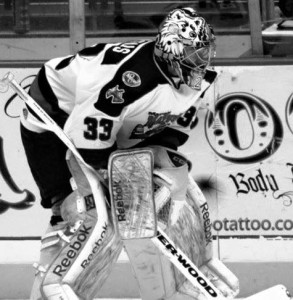
Garrett Bartus
On Ice Lesson
I have found it helpful throughout my career to stop and reflect on the season at different points, and there is no better time to check in that the halfway point of the year. As a goalie, it’s important to constantly be evaluating your performance to make sure you are performing at your best, especially going into the home stretch of the season.
One thing on the ice that I have been diligently working on is probably something I have told any goalie that has worked with me, and that would be the importance of getting your feet set before the shot. As simple as that sounds, there is quite a bit that goes into that. The ability to read plays is a must; knowing where guys are on the ice and what hand they shoot, what the puck carrier’s options are, who is a shooter and who is a pass first player, all of which factor into the equation. My ability to execute this skill directly stems from being a good skater. By getting my feet set, I play bigger and feel very square to the shooter, forcing them into making a difficult shot to beat me. Sometimes good shooters will score good goals, I’ve learned that’s part of the game, but more often than not if my feet are set and I see the puck I have a lot of confidence I’ll stop it.
Off Ice Lesson
As we all know, goaltending isn’t just about your on ice abilities. Even the best in the world struggle from time to time, and it has less to do with on ice ability and more to do with the mental aspect. Personally, I’ve learned this year to just let go of the minor day to day distractions and focus on enjoying the process so I can have fun doing something I truly love to do. Whether you are a mite goalie just learning the position, or you are a guy like me who has been lucky enough to be playing the game for 20 years, it is a privilege to be able to step on the ice and stop pucks. When I am having fun and play relaxed, things don’t bother me as much and I’m play without getting in my own way. This balance is what I have found to be the key to success but that doesn’t mean that everybody operates the same way I do. The real secret is knowing your game inside and out so that you can walk the balance beam along too much and too little. Those who find this balance have a huge advantage over a guy with maybe more on ice skill but not as much self awareness. Finding my balance has been a big reason why I’m playing with a lot of confidence and leading the SPHL in saves!
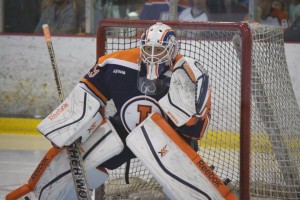 David Heflin
David Heflin
On Ice Lesson
As I have gotten older, I feel my game is very developed and the foundation of how I play doesn’t change much. The adjustments I look for are smaller in nature but can produce a noticeable difference and I certainly think the learning curve of any goalie is an ongoing process. As this season has progressed, I found myself uncharacteristically sitting deeper in my net as the play developed into the offensive zone. I feel this was happening because I was worrying about backdoor passes, opposing forwards crashing the net, and basically any play that ended up with puck being passed around me. I finally realized this before thanksgiving in a game where I eventually got pulled after giving up four goals in the first period. Two of the goals were ‘2 on 1’s’ where I was beaten high short side. It left me with a moment of clarity that if I don’t fix this I’ll be beat again and again until something changes.
My most recent detail adjustment in my game is coming out and challenging the shooter a little more if and when I anticipate he will shoot the puck. I think that worrying about a play that has not yet happened is a distraction and was forcing me to think two steps ahead when I really needed to be doing the opposite. There’s a fine line us goalies have to decipher in every play about how much is ‘over fixating on the puck’ while also not cheating the play to the point of giving up short side goals. This adjustment has been a work in progress but something I am noticing is helping with more awareness in practice.
Off Ice Lesson
This past year I transferred to University of Illinois and all the sudden school became much harder and more time consuming. Although while at Wisconsin-River Falls we practiced at an earlier time, I was able to get my workouts and studies in before practice, and was left with plenty of time to finish homework before it was time to do it all over the next day. With my different time schedule and heavier homework load, I’ve had to become more efficient and manage my school work better in order to find time to still be invested fully in my hockey responsibilities.
A new schedule and scenery change has changed the way I have become accustomed to getting things done. That is a lot to take in all at the same time and solving this logistical problem didn’t happen overnight, it took me roughly 6 weeks to get into a good comfortable rhythm. Even as junior, managing school and hockey is still of the utmost importance.
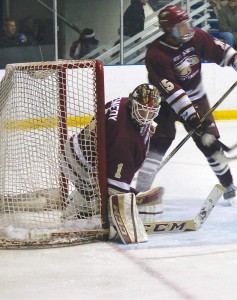
Rob Kennedy
On Ice Lesson
Something that has been a big focus of mine this year has been managing my depth in the crease. At this point in my game, it’s all about making little changes that yield a large impact. Something as small as taking an extra inch or two of ice on a push out from low to high is literally the difference of the puck finding the top corner and triggering the red light or grazing my shoulder and extending the play. With this in mind, I have worked on being more aware of the play when the puck is below the goal line. Particularly when the player is not a threat to shoot, I will take multiple looks to find his best passing options and where I anticipate the puck will go. With more awareness and anticipation of the play, I feel less “scrambly” and more set for shots which has helped my overall timing and flow in net.
Off Ice Lesson
This season has provided me with a unique situation that I have yet to experience in my college career. After three years spent ‘paying my dues’ in the college hockey world, I was given the opportunity to be in the line up more regularly and in bigger situations (something every goalie wants!). Early into the season I unfortunately ran into some injury problems which stifled my chance to start off hot and run with the #1 job. I realized I was putting a lot of negative pressure on myself to perform. I started having very detrimental thoughts like, My stats are far lower than what I expected them to be, I wonder if I will even play next Friday’s game? Or even worse, my coach didn’t play me in this game, what does that mean, is this something he’s doing on to teach me a lesson, what does he want me to do differently?
Allowing these thoughts to perpetuate my actions only made things worse and I began to sense that there was a direct connection between the ‘perspective’ of my situation and my ‘on ice performance.’ The way I maneuvered around this mental obstacle (negative self talk) was to convince myself I no longer wanted to play with the “need” to to do well. Instead, my motivation should come from an internal source, a place where I have control and feel very passionate about. I started to play the game again because I truly loved stopping pucks and wanted to enjoy the opportunity I had worked so hard to get. Worrying and reliving past experiences was wasting my energy that could be better spent a million other ways. One of the biggest gains I have made this season so far is in between the ears and it’s helped me a lot regain my form.
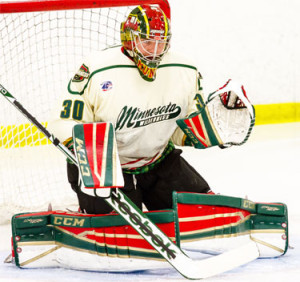 Chase Munroe
Chase Munroe
On Ice Lesson
This season I have placed a lot of focus on excelling at my skating and footwork in the crease. As I have advanced through the different stages of junior hockey, I notice that with each new level the skill and speed of the game becomes an adjustment. In particular, I’ve noticed the shots of opposing players gets much quicker and more accurate. My best solution to this problem has been improving my skating in net. It is very important for me now to beat the pass and have my feet set and in position before the shot is taken. This gives me such an advantage to stopping the puck since I can play big and react from my my stance.
I’ve been good about taking 5 minutes after every practice to fine tune this skill with basic goalie skating movements. I don’t need any shooters or even pucks, just an open space of ice and a willingness to work. I focus on trying to feel as solid and “effortless” when I do the movements so that when I find myself doing them in a game situation where my heart rate will be higher and adrenaline is flowing, I don’t hit the panic button and break my structure. I’m at my best when I’m calm and in control of my movements, and all of that starts with my skating.
Off Ice Lesson
Off the ice this season has been very important to me. Making adjustments to my mental game has really helped me get to where I am today and helped me earn a NCAA Division 1 opportunity next year with Miami of Ohio. As I’ve gotten older, I’ve noticed how long and physically demanding a hockey season can be. The days of me showing up to the rink 30 minutes before practice and going right on the ice, getting undressed and going right home are over. Muscles get tighter as we get older so taking care of myself in that way has been a big emphasis for me.
After skates and workouts I find myself always stretching or taking an ice bath to recover and prepare for the next day. Building my core strength and lower body power has allowed me to do what it takes to move and play the position effectively as a 6’4”, 220lb goaltender. With my improved diet and extra gym time this year I have become much lighter on the ice as well as more athletic in net.
